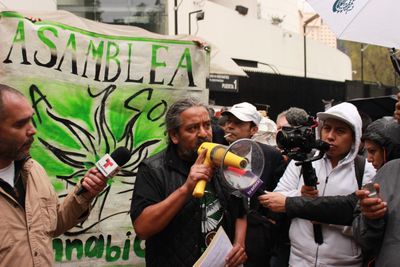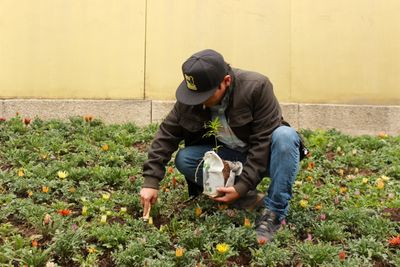
So what about the delay in legalizing cannabis in Mexico?
It was April 29, the day before the end of Mexico’s legislature, and Senate Chairman Ricardo Monreal explained to reporters why, after so much hype, his colleagues had missed the fourth deadline given by the Supreme Court to federally regulate cannabis .
“I am convinced that we have to do it and it is part of a possible extraordinary session,” said Monreal, head of senators for President Andrés Manuel López Obrador’s (better known as “AMLO”) Morena party, pointing out the chance of a special session to deal with the problem after the general election in June. “We are already working on the change to send the bill back to the Chamber of Deputies.”
After a complex three year legislative process, Monreal’s vagueness about the future of cannabis seemed a slap in the face to many of the country’s proponents and consumers.
A month ago, Mexican marijuana legalization seemed like a done deal. The bill was approved by the Senate last November but heavily changed by the House of Representatives, so Senators must finally approve the bill before sending it to the President. The legalization law was passed by two Senate committees. But then Monreal said they would ask the Supreme Court for more time, which means the bill would be halted until the next legislative sessions in September.
However, the senators have never officially asked for an extension or prórroga, which shows that in a country where law enforcement agencies blackmail cannabis users on a daily basis despite the decriminalization of small property owners, there are no concerns about a problem.
What the hell is going on then?
Cannabis protest in Mexico City, January 2020
Social pressures met political inaction
The government’s lack of urgency does not match the urgent need to protect the rights of Mexican cannabis users or to build the infrastructure for the country’s legal industry. On April 20, thousands came to support legalization for the Four Days of Tripping, a cannabis protest festival hosted by Plantón 420, one of Mexico’s most famous marijuana protest camps. Puffs of smoke from joints drifted past the Mexican Senate, which was located directly behind the protest camp. The youth mostly enjoyed the activist tolerance zone for marijuana use, while dub crews provided the soundtrack to a historic meeting that focused on the visibility of the country’s cannabis users.
The festival was impossible for government officials to miss. Plus, the event’s name was an ironic reference to a Chamber of Deputies lawmaker who used her time on the podium during a legalization debate to raise the alarm – and spread misinformation – about highly potent cannabis foods that instantly turned into a stoner meme .
Many people in Mexico see the value of legalization. Even groups outside of Mexico have shown a keen interest in speeding up the legalization process. International business interests from the US, Canada and beyond have had a positive impact on the Mexican cannabis market, which is expected to be the largest legal region in the world.
But the government’s progress on the law has stagnated, and the president and his party, who control both legislative houses, have nothing definite to say on the matter.
“Something cannot be a business if it harms public health or if it can lead to violence or loss of life,” AMLO told reporters at a press conference on April 14th.
And Monreal has given only vague references to calling an “extraordinary meeting” in June to learn about cannabis legalization.
“The decision not to move forward within the allotted time frame on April 30th implies that Congress is failing the Supreme Court mandate and leaving the door open for a likely general declaration of unconstitutionality,” said Patricia Mercado, longtime advocate of decriminalization and Citizen Movement Party Senator, in a statement.
“I still believe that it is imperative that we regulate adult cannabis use very soon,” she continued. “Yes, in order to guarantee the right to free personal development, but also to exercise justice, to pacify the path to pacification and to find new alternatives for scientific research, productive projects, jobs and tax contributions, all of which are urgently needed in our country. “
Cannabis lawyer Leopoldo Rivera speaks to the Senate, 2019
Choice problems and massive egos
There appears to be little political will to enforce legalization, likely because AMLO is socially conservative – it has shown disturbing support for evangelical anti-drug campaigns, even accusing drug users of skyrocketing national homicide rates – and little motivation to regulate cannabis. It is also important for him to retain the support of the majority. A 2020 poll found that 60 percent of Mexicans are against legalization, making adopting it a risky political move.
After the Morena Party’s legislature passed the 2019 law that made Oaxaca the second state to legalize abortion, it is now believed that the party is not “branded by the other parties as pro-marijuana, radical, pro-crime.” wants to be “. Pro-drug party, ”says Sam Stone, full-time law professor at the Universidad de las Américas in Puebla.
Another problem is that large political egos are at work. “There’s an issue with authorship,” says Amaya Ordorika, advocacy coordinator for ReverdeSer, a Mexican drug policy organization run by substance users. Ordorika refers to the power struggle between the two legislatures that will ultimately determine the outcome of cannabis legalization.
Discrepancies between versions of the invoice are a major problem. The House of Representatives made profound changes to the Senate-born bill, including removing the Institute for Cannabis Regulation and Control, the agency that would oversee legal cannabis in the country and place control of the plant in the hands of the National Commission Against Addiction [CONAVIT] – a move that nominally classifies all marijuana uses as pathological.
The MPs’ bill also bans people convicted of a drug-related crime or organized crime from joining a cannabis club. In a country where the Supreme Court has declared the ban on drugs as a violation of the constitutional rights of Mexicans, this last provision is a clear extension of state injustice.
Perhaps the most disturbing change to the legalization bill is how MPs have removed many of its social justice measures. The Senators’ version originally required that 40 percent of all cannabis business licenses in the first five years go to people from indigenous communities, who in many ways bear the brunt of the aftermath of the war on drugs. MEPs have rewritten the section to ensure that these communities are only prioritized for the first three years – without specifying exactly what such “prioritization” might entail.
Protest planting in Mexico City, January 2020
Legal process goes into “unknown territory”
The problem is compounded by confusion over the Supreme Court mandate that made the cannabis ban unconstitutional, a legal process that has never occurred before in Mexican history. Unconstitutionality can only occur by order of a powerful legal order in the Mexican legal system: amparos or orders submitted by persons who believe that a government agency is violating their rights.
Amparos rarely lead to a change in the law; Five such decisions in favor of the individual are required to establish case law or a change in the legal system at the level of the Supreme Court. (In the United States, by comparison, only one such case is required.) In 2018, the Supreme Court ruled that the cannabis ban was unconstitutional – a mandate for lawmakers to work out the nuances of regulation and officially legalize drug use. happened on the heels of the fifth Amparo consumer.
However, the Supreme Court has rarely, if ever, used the Amparo system to demand the repeal of a longstanding law. The declaration of the cannabis ban unconstitutional is unprecedented in the context of the Mexican legalization process. And now that lawmakers are extremely late in complying with the court’s mandate, judges may not be sure what options the court has to enforce legalization.
“Since this is something very new in our system, I don’t know what the consequences of a complete failure would be [to regulate cannabis]”Says Dr. Kira Ciófalo Lagos, a full-time law professor at the Universidad de las Américas, who describes the situation as “unknown territory” for the Supreme Court.
Ciófalo explains that there are two possible avenues for progress. For one thing, the Supreme Court may be fed up with legislators twirling their knuckles on creating and enforcing laws, declaring the current cannabis ban unconstitutional – a prospect that could see the existing law overturned without new regulations take his place. Monreal had previously predicted that such a move by the Mexican Supreme Court would cause “chaos”. The second is that judges may benefit from new laws that allow officials to impose a substantial fine if they meddle or take too long to process the results of an amparos.
Some activists believe the court that made the pot ban unconstitutional is the answer. “I ask that there be no more prórrogas in the sense that it is made unconstitutional enough so that [cannabis] can be like epazote, arugula, or other plants, ”said Karina Malpica, cannabis advocate, at a 4/20 event in Mexico City. “I think this is how the rights of all consumers can be respected.”
These measures seem unlikely to some, given AMLO’s recent judicial reforms that consolidated its control over the court. “With the new judges from Morena, it is now difficult to say how loyal they will be to the political projects Morena wants to implement,” says Stone, “especially before the summer elections.”
The uncertainty has left the leaders of the legalization movement quite desperate – and ready to accept the passage of a legalization bill regardless of its drawbacks.
“Every time you change this bill, it gets worse,” says drug policy expert Zara Snapp, who, like many proponents, is in favor of swift adoption of the current version of the legislation instead of waiting endlessly for a perfect law that never takes shape.



Post a comment: